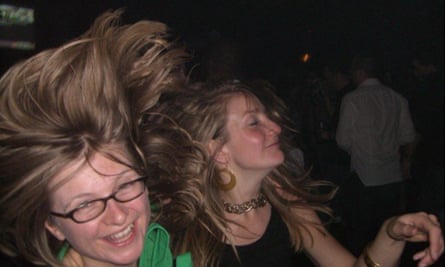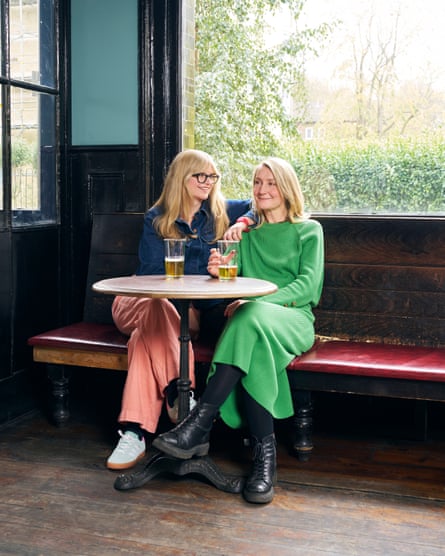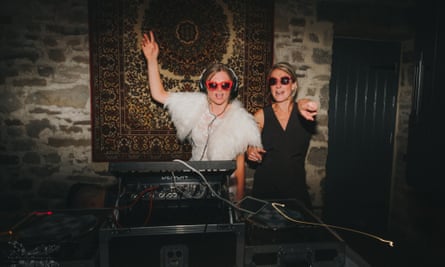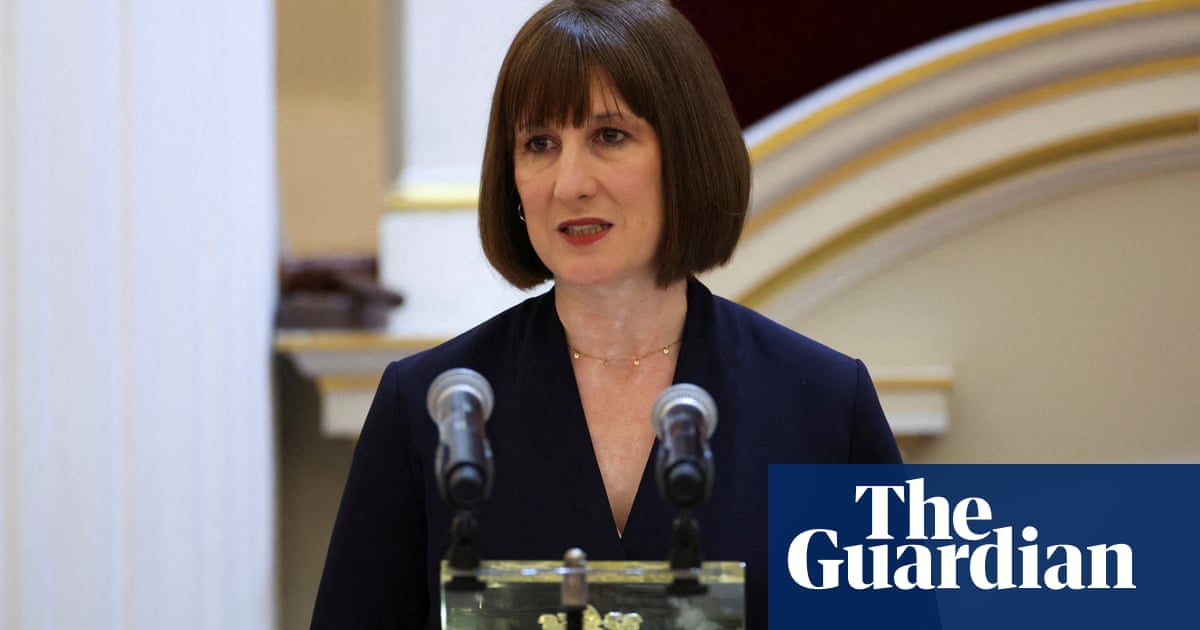Helen
The night I first met Lexy, I was supposed to be going on a date. I was 25 and had yet to really make friends since moving to London, so when she asked me for a drink I said yes. The Guardian tended to hire only one young reporter a year in those days, and Lexy was the fresh face for 2006 (I was 2004 – it had been a rather lonely first two years).
She had just returned from living in Paris and exuded a certain French cool. Her wardrobe seemed to have been sourced almost entirely from a little vintage shop in the Marais, which would have made her insufferable were it not fatally undermined by her coming from Skelmersdale, the least glamorous town in the Lancashire coalfields. She was funny and clever and generous with her compliments (I was thrilled when she said she liked my shoes – metallic blue-and-silver Mary Janes) and when I reluctantly trotted off on my date, I spent the night wishing I was back with her instead.
Everything was more fun with Lexy. There is something very special about making a best friend in early adulthood, when your brain is fully developed and your personality formed but your responsibilities do not extend beyond paying the rent and turning up to work on time. You’re not mates simply because your names went after each other in the register, or because you were lumped together in the same university halls. Lexy and I were kindred spirits: the babies of the Guardian newsroom, two blonde northerners let loose in noughties London. She soon became both my biggest cheerleader and harshest critic – two essential attributes for any proper pal.
We spent our days scribbling shorthand at the Old Bailey and our nights out in east London, often on some sort of manhunt, despite us preferring each other to any boy on the market. She generally had far more success, but occasionally the stars aligned for us both. I used to enjoy the mornings-after as much as the nights themselves, as we howled with laughter at whatever nonsense we had been up to until the early hours. We never liked it when the other got a boyfriend: she was furious with me when a snog at the Camden Crawl turned into a relationship just before what she had pre-emptively called our “summer of fun”. Direct quote: “You’ve ruined everything.”
A favourite haunt was the Birdcage, a Hackney pub with a karaoke machine that attracted both indie sleaze mavens and proper East Enders. One night we used our appalling pool-playing to attract the attention of a promising young duo: a Swede for Lexy, and, for me, a rough diamond I thought was going to be my first cockney conquest but whose mother, it later transpired, was a feature writer at the Telegraph.

I don’t remember talking about having kids much when we were in our 20s. I just assumed we would both have as many as we fancied when the time was right. When she got pregnant, at 34, I’d spent a few years living abroad and had moved to Manchester. I was happy for her but also, frankly, jealous. My long-term relationship had come to a calamitous end and, at 33, I was panicking about my own reproductive window slamming shut.
Everybody seemed to be having babies except me. My response, I realise now, was to try to make my life more exciting. I made new friends: hedonists who could go away outside the school holidays and could make a plan without having to factor in nap times. I invited a Syrian refugee to live with me for six months, went on ridiculously long bike rides, and upped my extracurricular antics, doing everything Lexy no longer could.
Not long after her son was born, I was staying with her in London for a few days and one night simply didn’t go back, partaking instead in an ill-advised sleepover at the opposite end of the tube map. On the slightly melancholy ride home, I tried to dampen down my regret by thinking to myself, “Well, Lexy can’t do this any more!” (Nor, it has to be said, did she want to). I still have a photo I took of myself holding her baby when I got in, my eyes bloodshot and the previous night’s mascara smudged under each eye. Looking at that photo now, I see someone trying a bit too hard to have fun.
I was thrilled when she asked me to be her son’s god(less)mother but resented her new NCT friends, worrying they would replace me. When her son turned one, she invited me to the party and I sat in her kitchen, the only woman without a baby on her knee, and felt like a barren alien. She used to insist she liked not talking about child-rearing with me, that I talked to her about interesting things. But it was the first time that I felt excluded from any part of her life. She used to tell me everything: now I was only getting half the story.
The half was not what it used to be, either. I am old enough now to realise that all new mothers are too knackered for the first year(s) to do anything other than keep their babies alive. But the truth is that having a baby doesn’t make anyone more interesting. It softens some people and toughens others up. But the all-encompassing nature of parenthood, particularly for mothers in the early years, means there is neither time nor energy to discuss anything else. I wouldn’t say I found Lexy boring, but there was basically nothing to report apart from how tired she was and how hard breastfeeding is.
In the decade since my friends began breeding in earnest, some have more or less disappeared from my life. Maybe they just didn’t value me that much anyway. But there comes a point when you are doing all the running in a friendship that you start to feel bitter. I give every parent a pass for the first few years. After that, if you want to still be my friend: make an effort.
I missed the old Lexy. I missed going on holiday with her. I missed the decadent dinners we would have when she didn’t spend half her salary on nursery fees. I missed spontaneity. I missed inviting her to something and her being able to say yes without first negotiating childcare with her partner.
Sometimes it was hard to bridge the divide between my life and hers, particularly during the painful years after I got married in 2017 when I was trying and failing to get pregnant and she had her second baby, a girl. I didn’t tell her that we had been referred for IVF until very late in the process. Now I was the one keeping a big part of my life from her. I knew she wanted to know how it was going, and that she was genuinely sad for me when each cycle failed. But she was not the person I wanted to be comforted by. It wasn’t her fault, but she was too fertile for my fragile state of mind. There was nothing she could say to make me feel better. The only people I talked to in detail had been through the same heartache, or at least had difficulty conceiving themselves. Lexy occasionally would try to tell me what a great life I had without kids, which was true. But I didn’t want to hear it from her.
About 18 months after I gave up on IVF, we finally started talking properly again. I’d been on a particularly outrageous holiday to Barbados in January during term time, and, as I swayed in a hammock, drinking piña coladas, started to see the upside in my situation. I returned tanned and at peace, and we had a noughties-style night out that ended up with her discovering a mysterious chilli in her handbag the morning after.
The pivotal chat, which began in the Sheffield pub we used to go to when we were trainee journalists, began with me lamenting having not seen much of her youngest (then almost three) when she was a baby. Lexy shot me a look as if to say, “Do you really not realise why you weren’t there?” I hadn’t deliberately avoided her daughter, but her first year was the start of what I must reluctantly call my fertility journey. It hurt too much. I really wish now that I could have been a better friend.
She admitted it was hard for her to know what she could and couldn’t say about her kids. She didn’t know if she could moan about them when they were doing her head in, or whether that would seem heartless to someone who wanted kids but couldn’t have them. She said she held back from sharing with me the joy of parenting and the pure delight that children can bring. I felt sad she couldn’t tell me these things, but I knew I didn’t want to hear them. I can hear the moaning all day long. It’s the joy I find harder to swallow, perhaps because it confirms what I still fear may be true: that having children is life’s greatest pleasure.
You know the Q&A in the Guardian every Saturday, which asks celebrities a series of questions? The one that always makes me feel most inadequate asks for their proudest achievement. Parents almost always say their children, no matter how many Oscars they have won. Is that because being a mum or a dad really is the most rewarding job of all? Or because it’s so hard that if their kids turn out OK it really does seem like the greatest accomplishment? Or because it’s the sort of thing you are supposed to say?
But I also know now that having kids is not all proud parents’ evenings and bathing in a lifelong glow of reciprocated love. That cute little babies can turn into anarchist toddlers and grumpy teenagers, and that while parenting certainly keeps you busy, it doesn’t necessarily stave off an existential crisis. I see the sacrifices Lexy makes for her children, the freedoms she gives up to be a good mum, and sometimes wonder, would I have been willing to do the same? When I got married I gained a lovely stepdaughter, who is now 15. She and I have a special relationship, but my role is not really parental. I provide the fun and adventures rather than doing the hard yards.
Now that Lexy and I can actually talk about all of this, we have reached the following conclusions: that however much we loved each other, there were times when we just were not the right person to be holding the other’s hand. And that there is happiness and joy on both sides of the parenting divide – as well as occasional regret about the path not taken.
She admits she sometimes envies my life – better holidays, lazy Sunday mornings reading the paper, uninterrupted sleep, all the classic childfree tropes. And sometimes I envy her shaping the lives of her two wonderful children, who love her unconditionally and who really do say the funniest things. Should they ever go on to procreate I will no doubt feel jealous all over again when Lexy becomes a granny. But I hope to stay in their lives for ever: their daft Auntie Helen who makes their mum laugh till she cries.

Alexandra
I can remember so clearly the first time I met Helen. I’d just joined the Guardian, and we arranged to meet at a pub nearby. She was wearing an electric-blue skater skirt, black top and matching Mary Janes; we drank pints and laughed at each other’s jokes. She had a date that night, and before we left asked me to check that she didn’t smell. I thought, “I’m going to have so much fun with this girl.”
That September, the Guardian paid for us both to go to Sheffield to study journalism for three months, even though Helen had already been working as a journalist for years. I was 26, just out of a serious relationship. She was 25, single and ambitious.
Back in the north, we were unstoppable. We studied media law and immediately applied our learning by telling all the boys who touched our bums in the Leadmill (shots of vodka: 50p; bottles of blue WKD: £1) that they were in contravention of the 2003 Sexual Offences Act. Helen had a side gig as an occasional music reviewer – I remember watching her, pint tucked under her arm, dancing to the beat, scribbling in her notebook.
In an early class, we were set the task of interviewing the person next to us, before relaying to the other students the most surprising thing about them. “What you might find interesting about Helen,” said our friend Bex, “is that despite seeming like an ambitious career woman, all she really wants to do is have loads of kids.” I took the piss out of her afterwards. “What?” she said, jutting out her chin with classic Pidd stubbornness. “It’s true.”
The marauding continued when we moved back to London. We put on our best frocks and had extravagant boozy lunches; we went dancing in basements; flew to Istanbul, Granada, Jerez. We made dinners, played ping-pong, pulled dodgy boys, belted out Total Eclipse of the Heart on the night bus. We drank so many cups of tea, spluttering on the sofa when we remembered another detail from the night before. It felt a lot like falling in love.
The pace of the friendship changed, of course. Helen moved in with a boyfriend; I started an ill-fated love affair with a Frenchman, and spent a lot of time going back and forth to Paris. Helen started her foreign correspondent years – but she was still resolutely my best friend. We hung out in Berlin, in Austria, in London, in Spain. She moved to Manchester to become the north of England editor. I missed her like hell, but she was still such a part of my life.
In my early 30s, I fell in love with my partner. We were on our first holiday together in the Highlands when a doctor called me to say that a routine smear had found cancerous cells on my cervix. They’d caught it early, and the machinery of the NHS moved up a gear – more tests, then, quickly, procedures. When we came out of the other side I was 33, and we were all in. We bought our first house and on a drunken night decided to have a baby. Nothing like being told you might not be able to have kids to focus the mind.
When our son was born, we asked Helen to be his godmother. She looked faintly horrified and told us she didn’t believe in God. She settled on “godlessmother” and threw herself into it. Helen has always loved babies. After our boy was born, she came to visit and snuggled with him on the sofa. She took me for lunch and held him so I could eat uninterrupted. It was a shame that we weren’t having babies at the same time, but I assumed I’d also do this for her – just a bit later on.
She was 35 when she met her now husband. I was the best woman at her wedding; we DJed in sunglasses. I thought, “Crack on: let’s do it together next time.”

It took more than a year for me to get pregnant again. I knew Helen was trying, too – we spoke about the relative merits of cycle trackers, whether it was worth taking your temperature. Then I got the blue lines. I was driving when I told Helen. “Oh,” she said. “I thought you said you weren’t.” I tried to sound as offhand as possible. “Yeah, well, turns out I was wrong.”
A space hung between us. And as my pregnancy progressed, it got wider. Being pregnant with my first had made me feel like a superhero, but my body carried the new baby like a hostile agent. With a couple of months to go, scans showed she was small in the womb. Deemed high-risk, I traipsed to my hospital three times a week and sat in a packed maternity ward, while a noisy machine monitored her heart rate. I was so scared. Helen sent me a message one day: “This too shall pass.” She was saying she cared, but it felt so distant. She was saying she was there, but she wasn’t. I wanted to kill her.
The baby, expulsed early from my swollen body by drugs, propelled herself into the world surrounded by concerned doctors and midwives. She was, in the end, small but mighty. We went home the next day, wide-eyed with shock. I couldn’t breastfeed properly, she didn’t put on weight for weeks, nobody slept. In the maelstrom, I called my best friend from university. Having twice been through her own post-birth delirium, she heard my panic. She took time off work, left her kids with her husband and moved in for a few days. She emptied the dishwasher, played with my son, put a wash on. It genuinely felt like she’d saved my life.
It wasn’t that I wanted Helen to do that – she couldn’t. She messaged me support, made a collage card for the baby that read “A Star Is Born”. But I didn’t have the bandwidth to pick up the phone and tell her what I was actually going through. I couldn’t have explained it if I’d tried. I had this perfectly healthy baby girl, and all I wanted to do was cry.
Helen didn’t disappear. When the baby was six weeks old, deep in an exhausted fug I handed her over for the duration of a restaurant lunch, snatched before Helen shot off to Amsterdam for the weekend. She made it to mine; I took the kids up to hers. But then Covid struck, and by the time it was over, my life was an endless round of dashing to the childminder from work, washing small clothes and failing to have a good night’s sleep. Helen, meanwhile, was constantly on another adventure.
I always wanted to hear what new project she was working on, or where she was going next, even if I wanted her not to have as good a time as she would have done with me. I probably felt quite boring by comparison. When I did speak to her about my kids, I made sure to only tell the funny stuff.
Over the next few years, the cord that had expanded and retracted between us for more than a decade stretched further, became taut, which we now realise coincided with her starting IVF. When she told me about it, I weighed every word carefully. I remember standing at the kitchen sink while she – in a matter-of-fact tone – set out the intricacies of the process and why it probably wouldn’t work. I mainly tried not to say the wrong thing. I wanted to be supportive, but I felt useless.
After Helen’s final round of IVF failed, I had no idea what to do. I almost certainly didn’t do enough. We’ve talked about it since, how I was not the person to provide succour. I wish I had been. When she told me they weren’t going to try again, I felt profoundly sad. Sad for her, sad for them and, in some, undeniable way, sad for us. From that point on, we would always be on separate tracks, I thought.
But, actually, it was the start of us finding our way back to each other. The elastic didn’t exactly twang back into place, but it has drawn us in, gently. When her Saturday magazine piece about accepting being childfree came out last year, I read it again and again. I was so glad that writing it had been a positive experience and had helped so many other people. But there was something else. “It also makes me a bit jealous, in all honesty,” I rambled in a voice note I recorded at the time. “Jealous of this kind of super-exciting crowdsurfing life that you have that is so, so far away from mine. Like, I’m literally running the bath right now and I’m hiding from my kids so that I can have two minutes … I can’t put this down on paper, because I haven’t got time.”
Because the thing that you can’t share with your friends who wanted children but didn’t have them is how – not all the time, but sometimes, fiercely – you long for the freedom they would do anything to give up. The ability, as Helen wrote, “to be responsible for your own destiny” rather than responsible for another human’s safety, development, hygiene and happiness. You want the spontaneity, the space, the unscripted hours. You never want to go to another kid’s birthday party again.
I started writing this piece hunched over my phone in the rain while my kids played hockey. It’s been tapped away at tennis practice, and in the dark hours of the early morning – the only time there is peace in the house. Helen started hers on the Eurostar on the way to the south of France for a weekend with her husband.
Even as I write this I cringe at my own solipsistic ingratitude. I know I have no right to moan. I know what a privilege motherhood is, how lucky I am. But is it OK to feel envious? Just occasionally?
But the other thing mothers –ones like me, at least – keep secret is the psychedelic, heady joy of it. The moment when your sleepy firstborn buries his head into your neck and says, “Mama, I love you so, so much”, and you feel a flood of oxytocin that at 6.55am beats the best pill of your life. The extraordinary, ordinary mornings with both kids in bed, laughing at your partner’s silliness. The firework of pride when your kid scores the winner in the last minute of a finely balanced under-nines football match. Dancing in the kitchen with a little girl who, somehow, contains the purest version of your best self.
But maybe you don’t have to share everything in a friendship. Maybe its intensity can ebb and flow while the core remains fixed. As the kids get older we can go out for dinner more easily, and phone calls aren’t always interrupted; this year we managed a classic Big Night Out in a Foreign City (chino-wearing big-bummed boys, we apologise for our hilarity). Helen is my kids’ favourite fake auntie; I hope I’m still her favourite dance partner.
In A Life’s Work, Rachel Cusk said of seeing old friends after having a baby that they met “at the uncrossable border between the free world and the closed regime of motherhood”. Mine and Helen’s friendship felt like that for a while, but as the years continue, the connection that made us both realise we’d met someone important in the pub on that first night is still there. It’s in the texts and the shared jokes, the work chats and the sparse but regular weekends of fun. It’s in the stories we repeat, and the ones we’re still creating. If there is a border, it can be traversed – and we both have a pass.

.png) 1 month ago
16
1 month ago
16













































